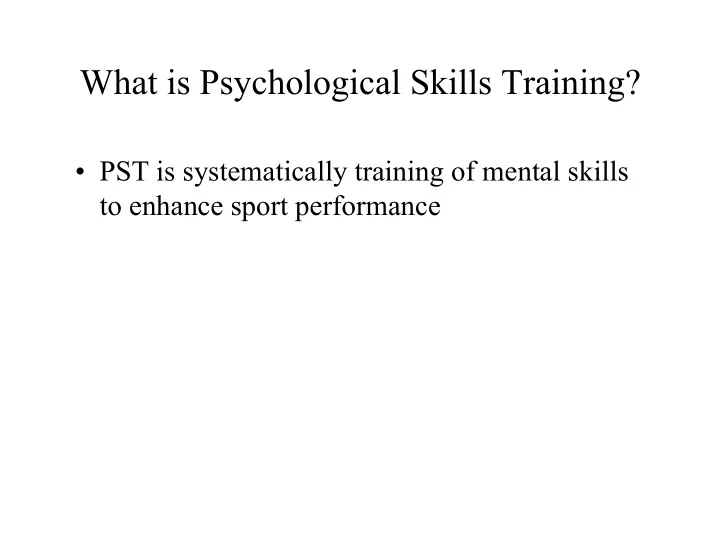

What is Psychological Skills Training? • PST is systematically training of mental skills to enhance sport performance
Why Is PST � Important? Key: Psychological factors account primarily for day-to-day fluctuations in performance.
Why Are Psychological Skills Neglected? Lack of knowledge Misunderstandings about psychological skills (e.g., they can’t be learned) Lack of time
PST Myths 1. PST is for “problem” athletes only. PST is for “elite” athletes only. 2. 3. PST provides “quick fix” solutions. 4. PST is not useful.
PST Knowledge Base Research on elite athletes shows that most successful athletes differ from less successful ones because they have better concentration, higher confidence, more task-oriented thoughts, lower anxiety, (continued)
PST Knowledge Base Research on elite athletes shows that most successful athletes differ from less successful ones because they have more positive thoughts and images, and more determination or commitment.
PST Knowledge Base Athletes and coaches found the most useful topics to be arousal regulation, imagery and mental preparation, increased motivation and commitment (goal setting), confidence, (continued)
PST Knowledge Base Athletes and coaches found the most useful topics to be attention or concentration, self-talk, and mental plans.
PST Effectiveness Educationally based psychological skills training enhances sport performance. Intervention must be individualized, employed systematically over time, and multimodal (combining different psychological skills such as imagery, self-talk, and goal setting). (continued)
Phases of PST Ed Educa ucati tion onal Ph Phase se 1. 1. � Psychological skills need to be learned and practiced. Expect improvement as you develop these skills and refine them over time.
Phases of PST Acq Acqui uisi siti tion Pha on Phase se 2. 2. � Focus on strategies and techniques for learning the different psychological skills. Tailor training programs to meet individual needs. You can provide general information to the group or team, but be specific when developing an individual’s PST program.
Phases of PST Pr Practi ctice ce Ph Phase se 3. 3. � Learning psychological skills should progress from practices and simulations to actual competitions. This phase focuses on automating skills through overlearning, integrating psychological skills, and simulating the skills you want to apply to actual competitions.
Implementing PST Programs When should you implement PST? In the off-season How long should training last? 10 to 15 minutes a day, 3 to 5 days per week Mental training should continue throughout an athlete’s sport participation.
Designing a PST Program Develop self-regulation processes Emphasize the importance of mental skills. Assess one’s strengths and weaknesses Analyze the demands of the sport Determine what skills to use Evaluate the program.
Develop self-regulated skills • Goal setting • Planning • Observing one’s skills • Evaluating their skills
Assessing the Athlete’s Mental Skills • Includes oral and written inventories • Use Common Inventories – TAIS – Sport Anxiety Inventory – Psychological Skills Inventory – Trait-State Confidence Inventory • Interview your athlete
What Psychological Skills Should be Included? • Depends on how many weeks of practice or length of preseason. • Depends on how much practice time will be devoted to PST • Performance Psychological Skills are: – Goal setting -Relaxation – Imagery -Attention Control
Designing a Schedule • Formal Program – Usually 1 to 2 days a week – Before or after practice • In Practice – Daily – Associated with drills, strategy or skills
Evaluation of PST • Provides feedback and allows for athletes to make changes • Interviews and written evaluations are common
Teaching Mental Skills Stress personal responsibility Use goal setting Develop pre and competition mental plans Practice it before using it in competition! Coaches need to demonstrate these skills in their coaching. Coaches behavior prior to and during competition, such as being in control, is critical.
Common Problems � in Implementing a � PST Program Lack of conviction Lack of time Lack of knowledge Lack of follow-up
THE END
Recommend
More recommend